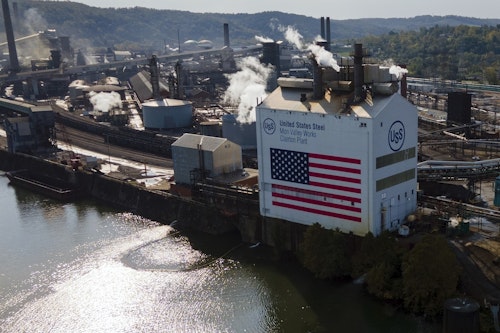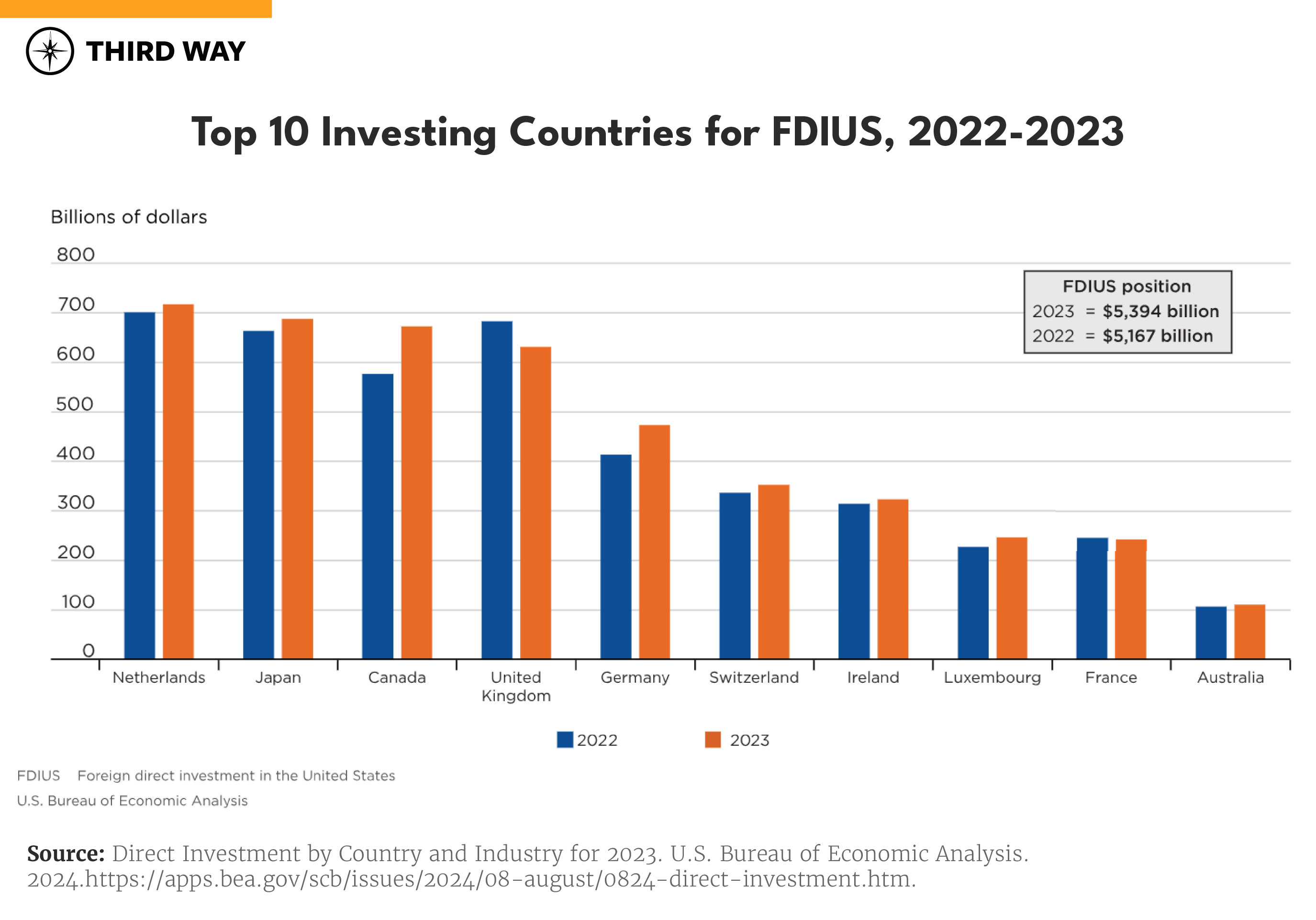Make the Deal—But Make it Better: Three Ways Trump Can Get More for America from Nippon’s Acquisition of US Steel

Japan-based Nippon Steel first announced its intent to buy the iconic US Steel in December 2023. The deal, valued at $14.9 billion ($55/share), has undergone intense scrutiny—for mostly good reasons—and it has now been subject to two separate reviews by the Committee on Foreign Investment in the United States (CFIUS). During the Biden Administration, the Committee failed to reach a consensus on the acquisition’s threat to national security and Biden made the decision to block the deal in late 2024 (making it official via Executive Order on January 3, 2025).
On the campaign trail and once in office, Trump voiced opposition to the deal while proceeding to initiate a second CFIUS review with newly-appointed members of the panel. That panel sent its recommendations to the President last week. What we are hearing is that the panel was split, but overall the recommendation is that the deal could move forward with proper mitigation measures. We continue to wait to see the details, but recent statements from the President and his proxies indicate that a deal will be approved.
While Nippon has already offered to take certain steps to mitigate concerns, there are reasonable additions that should be adopted. Though not currently under discussion, these conditions are critical to ensuring that the deal delivers long-term security for America’s steel industry, workers, and citizens.
Let’s Make a Deal
The best deal for America is the deal that has the highest likelihood of bringing sustained and permanent investment in state-of-the-art manufacturing here, in the USA. Trump should approve the deal with appropriate conditions for the protection of national security and economic competitiveness.
Facing drawn-out negotiations and skepticism from both Biden and Trump, Nippon has offered several concessions to mitigate US concerns regarding national security and fortify the American steel industry. According to Trump and his allies, under the new deal Nippon will invest $14 billion over the next 14 months, there will be a US CEO, the US will hold positions on the board, and there will be a “golden share.” Allegedly, this golden share will provide the US government with a say in board membership as well as changes to production levels.
These pledges build on those offered up in late 2024, which included: no reduction in production capacity for 10 years without approval from CFIUS, CFIUS would have a position as an observer on US Steel’s board of directors, and Nippon pledged that US Steel will have sufficient resources to pursue trade actions against unfairly traded imports. Since the time the deal was initially announced, Nippon has stated a commitment to not cutting any jobs as a result of the transaction and to upholding existing union contracts.
President Trump must hold Nippon to these pledges, making them legally binding and enforceable. But this should be where his negotiations begin, not end.
Approve the Transaction—with Additional Requirements
Beyond making permanent what Nippon has already pledged, the Trump Administration should consider conditioning a deal on additional mitigation measures that could further strengthen American steel production. These include:
Ensure future investments are made in advanced technologies for primary steel production. President Trump has the opportunity to make US Steel stronger and more competitive by requiring investment in state-of-the-art direct reduced iron (DRI) steelmaking capabilities. Though a new DRI facility initially would run on natural gas, it would also be retrofit-ready for hydrogen use when and where supplies become available. Running on natural gas, DRI is a significantly cleaner and more efficient process for primary steelmaking than current coal-based blast furnaces. This is the future of primary steel production and Nippon should be required to invest in the long-term success of this iconic US company.
Make existing assets as efficient and clean as possible. Nippon has already committed to relining all of US Steel’s blast furnaces. This is a questionable use of capital, given that the industry is moving away from coal-based steelmaking and the threat of stranded assets. But if Nippon is determined to take this step, let’s make the best out of a less-than-ideal situation. Nippon should be required to transfer its most advanced blast furnace technology currently used in Japan to the US Steel facilities, and should be held accountable for clean air and clean water in the communities near the facilities they will acquire. At the very least, Trump should require that US Steel facilities consistently meet all federal and local environmental requirements, which has not always been the case.
Require Nippon to maintain a minimum production in the US at all times. For national security purposes, the United States must always maintain a minimum level of primary steel production. There is a fear that Nippon could run their plants in Japan while idling US Steel assets in the United States. This is unacceptable as it would leave us vulnerable in a time of war due to a lack of supply of primary steel. While Nippon has offered no reduction in capacity for 10 years without CFIUS approval, this requirement should apply to production and not be time-limited. Nippon should be allowed to replace blast furnace production with DRI production, but maintaining a minimum level of primary steel production at all times is critical.
CFIUS Process
The Committee on Foreign Investment in the United States (CFIUS) is an interagency committee chaired by the Department of Treasury, authorized to review any “merger, acquisition, or takeover by, or with, any foreign person that could result in foreign control of any person engaged in interstate commerce in the United States to determine their impact on national security.” It has nine voting members, two non-voting ex officio members, and other members as appointed by the President. CFIUS reviews are confidential and no notice is provided to the public that a review is underway. The review proceeds to an investigation if CFIUS determines a transaction (a) threatens national security and the threat has not been mitigated, (b) is a foreign-government controlled transaction, or (c) or would result in control of any U.S. critical infrastructure by a foreign person.
The President can exercise authority to suspend or prohibit foreign investment, informed by a CFIUS review, if he/she finds national security risks that cannot be otherwise mitigated. This authority is rarely exercised. Presidents have prohibited only eight other transactions since 1990. To put this into perspective, in 2023 alone, CFIUS reviewed 342 filings.
How a Nippon Deal Could Enhance Security and Balance Competing Interests
Leveraging the CFIUS process to require appropriate mitigation measures be put in place, President Trump can use this deal as an opportunity to ensure America’s long-term security.
The Benefits for National Security and Competitiveness
The CFIUS reviews are focused on national security, and it makes sense to inspect and mitigate risks. But some concerns that have been raised regarding sale to a Japanese company are misplaced in this instance. Japan is one of America’s closest allies, with a long history of economic and political cooperation. Nippon already employs 4,000 American workers, reflecting their existing drive to create jobs in the US.
The most important–and in some ways least discussed–national security implications of this deal actually stem from its impacts related to China.
The biggest threat to national security comes from China's dominance in production capacity, as well as its growing influence around the globe. This is particularly evident in China's Belt and Road Initiative (BRI), which has expanded to encompass nearly 150 countries, accounting for two-thirds of the world's population and 40% of global GDP. As we've seen play out with China's BRI in many sectors, especially critical infrastructure, China is deploying capital liberally. As China continues to overproduce at home, they are also building capacity for steelmaking through offshoring—while the United States and other allies are not keeping up.
Japan and the United States need each other. Both have lost market share over the last decade while China has gained. Combined, the two companies would create the second-largest steel manufacturer in the world, forming a powerful counterbalance to China’s market control. A US-Japan partnership can also help ensure a safer, more secure global steel supply chain.
The Benefits of Negotiating in Good Faith
The US government is well within its rights to review and demand improvements upon a deal that could have national security implications. But it must not be seen as arbitrarily sinking a deal or being unwilling to negotiate in good faith, as this would have significant ripple effects on the US economy and our relationships with other countries. Japan is currently the largest foreign direct investor in the United States, with a record $783.3 billion invested as of 2023. 48% of that investment is in US manufacturing.

Japanese companies might be the first to reconsider their investment strategies in response to the decision, but they certainly won’t be the last.
The automotive industry serves as a prime example of Japan's significant presence in US manufacturing. Toyota, for instance, has made substantial investments in the United States as part of the broader push for friendshoring‒bringing more supply chains to our allies rather than relying on adversarial nations like China. We want to see more manufacturing in the US through friendshoring, not less. Unlike China’s command-and-control economy, America’s economic strength depends on a stable, capitalist, free-market economy. That means we must continue to provide incentives and foster relationships to garner foreign investment.
This decision also raises questions about the consistency and predictability of US policy toward foreign investments. Hyundai's announcement of plans to build a $6 billion state-of-the-art steel plant in Louisiana highlights the ongoing interest of foreign companies in investing in critical US industries. How the US handles the Nippon deal could determine whether America continues to attract foreign direct investment in the future‒or if we push critical allies and economic growth away.
Conclusion
A properly structured deal can ensure Nippon’s acquisition of US Steel poses no national security threat. But, the Trump Administration should not stop at this “do no harm” approach. Trump should negotiate a deal that puts the American steel industry in a stronger position, guarantees a solid foundation for sustained domestic production, and leaves America better prepared to meet national security needs for the long-term.
If Trump properly uses the tools at his disposal and requires the above conditions be met as part of the acquisition, he has the opportunity to bring stability to global steel markets, promote the US's position on the world stage, encourage more investment in American manufacturing, and preserve the legacy of US Steel.
Subscribe
Get updates whenever new content is added. We'll never share your email with anyone.
